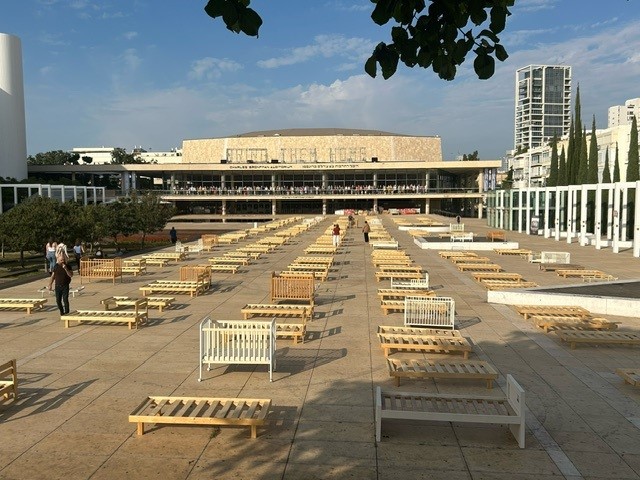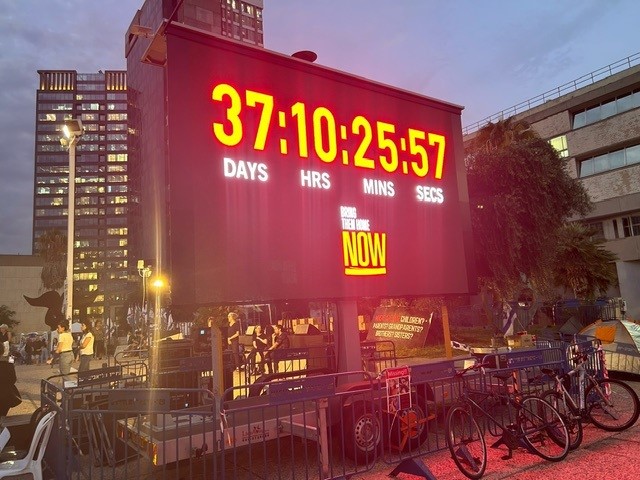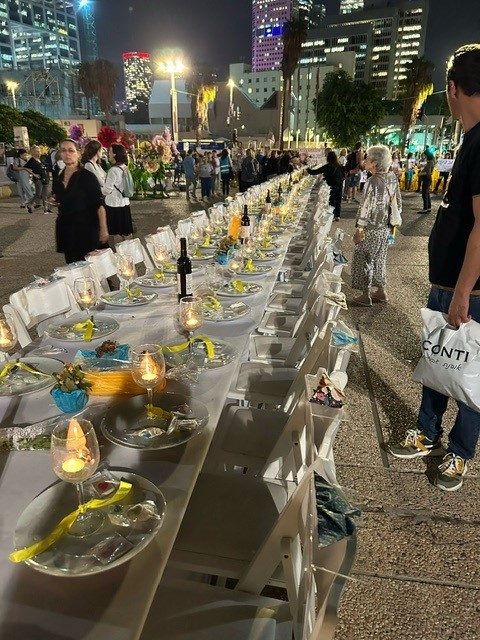Hatikvah: A Shabbat Service in Solidarity with Israel, October 13, 2023
By Rabbi Mark Glickman
When Caron and I were in Israel last February, we went with a couple dozen of my colleagues to a small cluster of communities near the Gaza border called Sha’ar Hanegev. Our hosts there welcomed us at the local community center, showed us into a meeting room, and, over tea and cakes, we had the chance to meet with this man:

Ofir Libstein
Ofir Libstein, the mayor of Sha’ar Hanegev. Mr. Libstein shared with us something of what life was like for him and his neighbors living in that troubled corner of the world. He spoke about the Palestinians on the other side of the border and acknowledged that, while some people in Gaza certainly wished him harm, he was confident that most of the Palestinians there were just like him – people with husbands, wives, children, and friends, just trying to live their lives as peaceably as they could.
Last Saturday, Hamas terrorists murdered Ofir Libstein in a firefight at Sha’ar Hanegev.

Hayim Katsman
This is a picture of Hayim Katsman, a peace activist whose 2021 dissertation at the University of Washington in the United States was entitled “Religious-Nationalism in Israel/Palestine.” Hayim’s grandfather was Ben Zion Wacholder, a renowned expert in the Dead Sea Scrolls who was a Talmud professor of mine when I was in rabbinical school. Hayim lived at Kibbutz Cholit. He died shielding a neighbor from the terrorists’ bullets. That neighbor later went on to save two children from the attacks, as well, adding to the circle of life saved by the heroic actions of Hayim Katsman that day.
My daughter, Shoshana, loves going to music festivals. She spent a few weeks in Israel earlier this year, but had she been there last Shabbat, she would almost certainly have been at the Supernova music festival, where Hamas murderers killed 263 people.
This touches us all. So many of us have connections like this to the events of the past week.
Saturday, October 7 was the deadliest day in the history of the Jewish people since the Holocaust. These are the pictures of just some of the victims.  The terrorists murdered more than 1300 people in Israel last Saturday. But that number – 1300 – hides so much. Because it’s not just that 1300 people were killed, it’s that Ofir Libstein was killed. And Hayim Katsman. And people with names like Nurit Berger. And Hannah Ben Arzi. And the list goes on, and on, and on. They were old, and they were young, they were married and they were single. They had families, they had partners, they had friends. Many were non-Jews, who were living or working in the Jewish state.
The terrorists murdered more than 1300 people in Israel last Saturday. But that number – 1300 – hides so much. Because it’s not just that 1300 people were killed, it’s that Ofir Libstein was killed. And Hayim Katsman. And people with names like Nurit Berger. And Hannah Ben Arzi. And the list goes on, and on, and on. They were old, and they were young, they were married and they were single. They had families, they had partners, they had friends. Many were non-Jews, who were living or working in the Jewish state.
“He who destroys a single life,” the Talmud says, “is considered to have destroyed a world.” In Saturday’s violence, 1300 lives came to a sudden end at the hands of terrorist evildoers. We mourn their deaths tonight; we pay tribute to their lives. About 150 others were taken hostage, and we pray for their safe return.
We are here tonight to celebrate Shabbat. And we are here to grieve. And we are here to reflect. And we are here because we need one another. And we are here in search of God’s comfort and guidance. When you kill one Jew, you injure the Jewish heart. And we are here to nurse our wounded heart together. It was Israelis who were attacked on Saturday, but, as Yehudah Amichai’s poem we read earlier notes, the diameter of that bomb extends much farther – even to here in Calgary and beyond. How wonderful it is that you are here, because tonight, I need to be with you. Because your community needs to be with you. Tonight, we need each other.
As your rabbi, I think I’m supposed to comfort you at this juncture, but I’m finding that difficult, because right now, I need comforting, too.
Out of the pain and grief of this moment, I would like to share a couple of thoughts.
First, this is a moment that calls for moral clarity on the part of the Jewish people. Israel was attacked by terrorists. Old people and young people were slaughtered, as we’ve noted – men, women, and children. The killers went to their victims’ homes, to their town centers, and to a music festival, and they filmed their multi-pronged pogrom so they could brag about it to the world as it happened and afterward.
There are those who blame Israeli policy for these attacks, arguing that Israel’s occupation of the West Bank and Gaza and its treatment of Palestinians somehow paved the way for the horrors of last Saturday. This argument is utter hogwash. Yes, there has been longstanding conflict between Israelis and. But when you and I are having a dispute, however nasty my own behavior might be, you don’t come to my home and kill my family. Such a response is never called for, it’s never “understandable,” it’s never a result of previous mistreatment. Accusations that Israeli policy brought this on are simply attempts to blame the victims, and to excuse unconscionable acts of terror. It is a perspective that we should refute at every possible opportunity.
There are those in the media who refer to the perpetrators of this violence as freedom fighters, and as people struggling for peace, and on behalf the rights of their people. That terminology is wrong, of course – the perpetrators were terrorists. People who are fighting for national liberation don’t attack concert-goers. People who want peace in their land don’t murder peace activists. Those who want a better world for their people don’t commit brutal acts of terror.
Let’s be clear. Like many of us, I’m opposed to the occupation. Like many, I dream of a state for the Palestinian people just as we Jews have. And I, too, am horrified at some of the ways Israel has treated those who live in Gaza and the West Bank. But none of this – none of it – caused this week’s carnage. This week’s carnage was a reprehensible act of hate perpetrated by people committed to violence and evil. Full stop.
“Yes, but the occupation,” some people say. “Yes, but the corruption of the Netanyahu government. Yes, but ….”
For the murder of infants, there is no “yes but.”
For the slaughter of innocents, there is no “yes but.”
For taking the elderly and the wounded hostage in a war zone, “yes but” has no place.
And now, Israel is left with no choice but to fight Hamas: to eliminate the threat that they pose, to guarantee the safety of innocent Israelis, and to bring the hostages home. God willing, Israel will be able to minimize the loss of innocent lives on the other side of the border. Sadly, tragically, with Hamas using Palestinian citizens and Israeli hostages as human shields, such deaths may be unavoidable.
As Israel engages in this important but necessary struggle, we need to support Israel however we can. So, when you hear friends and coworkers blaming Israel for these attacks, you need to call out those views. And when you read editorials and social media posts echoing these ideas, write back with rejoinders. And when you see Israel blamed for the slaughter of its own, stand strong beside her. And donate generously to Israel, because Israel and her citizens need our help.
Second, let’s remember that although these attacks targeted mostly Jewish Israelis, Jews are far from the only victims of Hamas’s terror. Hamas has caused great suffering on the part of Palestinians, too. Israel ended its occupation of Gaza in 2005, and soon afterward, Hamas took control of the area. It was a moment of such promise when Israel gave Gazans their autonomy. But Hamas squandered foreign aid in a morass of corruption. Hamas thugs quashed their political opponents, often violently. And now, Hamas terrorists have brought upon Gaza’s citizens the full wrath of the Israel Defense Forces. Hamas now has Jewish blood on its hands, and it has Palestinian blood on its hands, too.
Let us hope and pray that, in the heat of war, Israel is able to remember this as it engages in the crucial task of defending itself against terrorism. There are more than two million people living in that little Gaza strip. There is no electricity, and Israel, who maintains external control of the area, has turned off access to food and water. The only way out might have been through Egypt, but Egypt hasn’t opened the door. There are evildoers there, they live among the innocents, and the combination of the evil and the innocent represents a humanitarian disaster in the making.
Can Israel aim its missiles at the bad guys while sparing the good guys? I don’t think so, but hopefully, Israel can minimize the loss of innocent lives. Is there a way for Israel to do what it needs to do without starving people who didn’t have anything to do with the violence? I don’t know, but it’s an important question to ask.
The line between self-defense and bloodthirstiness gets blurry at times such as these, but it’s an important one to draw. Our tradition allows us to kill those who are trying to kill us, and it vehemently prohibits us from killing others. Let’s pray that Israel and its leaders keep to both of those crucial moral requirements as they do what they need to do.
Third, this is Shabbat B’reishit, when we Jews read the opening verses of the Torah. As I was reading the portion this week, my eyes were drawn to the story of Cain and Abel. Cain, according to the Torah, was history’s first murderer – the first person who rose up against their fellow human being and took their life. In this case, it was the life of Cain’s brother, Abel.
In 1981, Israeli poet Dan Pagis wrote about the aftermath of this murder from the perspective of Cain and Abel’s mother, Eve.
The poem is called “Written in Pencil in the Sealed Railway-Car,” and its title indicates that Dan Pagis is projecting the story of Cain, Abel, and their mother Eve into the 1940s, the time of the Holocaust.
WRITTEN IN PENCIL IN THE SEALED RAILWAY-CAR
By Dan Pagis
here in this carload
i am eve
with abel my son
if you see my other son
cain son of man
tell him that i
I invite you to reflect for a few moments on these words. Eve sits in a railway car with the body of her murdered son. Her other son is Cain Son of Man, Kayin ben Adam, Cain Son of Adam. She searches for him, but he is far, far away. And she wants to say something to him, she wants to share what she is thinking and feeling. But when it comes time to put words to what is in her heart, she falls into silence. She writes a message, but she can’t finish the thought.
There are no words.
O God, we too sit with Abel. Abel is Ofir Libstein. Abel is Hayim Katsman. Abel is Nurit Berger, Hannah Ben Artzi, and all of the others. And Cain, the murderer is so far away…beyond touching for the moment, beyond embrace.
Cain, put down that stone! Enough killing! Enough bloodshed. Enough pain. And, God, please tell him that we…please tell him…please say….
O God, we weep tonight for our loss. We weep for the men and for the women and for the children. And we are so afraid. Bring calm to the land, O God. Please bring calm. Still, the hands of the evildoers, shield the innocent and grant Israel strength in protecting its citizens. And please, from the bottom of our hearts, we pray: bring the hostages home and bring them home safely.
Here, tonight, we sit together in solidarity with Israel, firmly committed to the struggle for all that we know to be good and holy.
Adonai oz l’amo yitein. Adonai y’vareich et amo vashalom. May God grant strength to our people, and may God bless our people with peace.
Shabbat. Shalom.

 They connect hostage families with government officials and resources, they conduct press conferences, they convene groups of foreign dignitaries, and, whenever possible, they negotiate on behalf of the hostages. There, our group met with several former Israeli ambassadors who are working on behalf of the hostages, and we also heard from several of the family members themselves, who told us their heartrending stories.
They connect hostage families with government officials and resources, they conduct press conferences, they convene groups of foreign dignitaries, and, whenever possible, they negotiate on behalf of the hostages. There, our group met with several former Israeli ambassadors who are working on behalf of the hostages, and we also heard from several of the family members themselves, who told us their heartrending stories.



 The terrorists murdered more than 1300 people in Israel last Saturday. But that number – 1300 – hides so much. Because it’s not just that 1300 people were killed, it’s that Ofir Libstein was killed. And Hayim Katsman. And people with names like Nurit Berger. And Hannah Ben Arzi. And the list goes on, and on, and on. They were old, and they were young, they were married and they were single. They had families, they had partners, they had friends. Many were non-Jews, who were living or working in the Jewish state.
The terrorists murdered more than 1300 people in Israel last Saturday. But that number – 1300 – hides so much. Because it’s not just that 1300 people were killed, it’s that Ofir Libstein was killed. And Hayim Katsman. And people with names like Nurit Berger. And Hannah Ben Arzi. And the list goes on, and on, and on. They were old, and they were young, they were married and they were single. They had families, they had partners, they had friends. Many were non-Jews, who were living or working in the Jewish state.